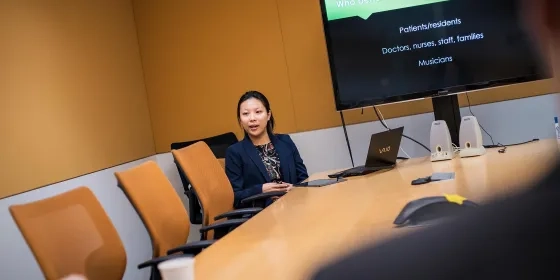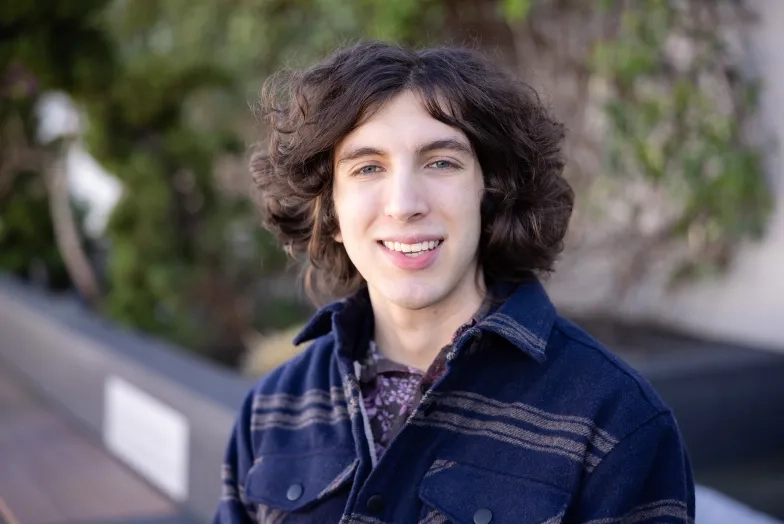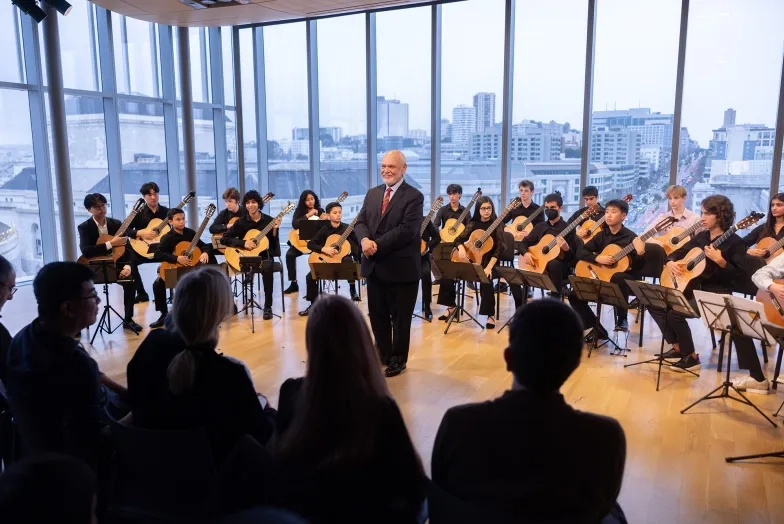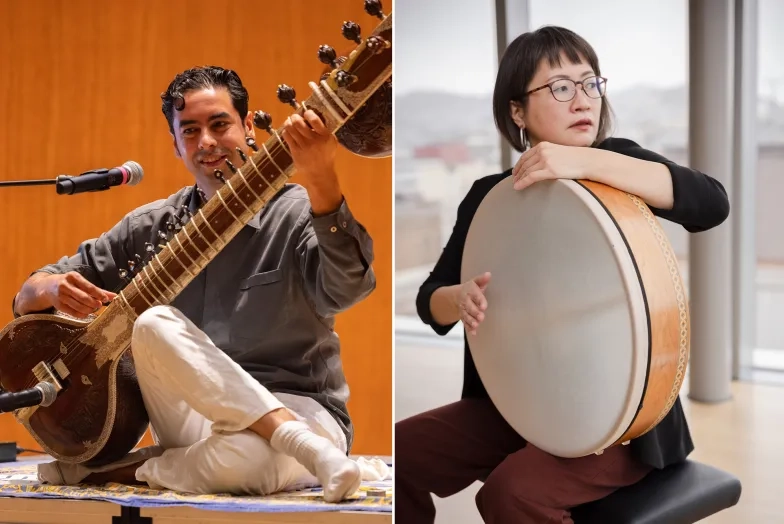Students Receive Grants to Pursue Special Projects
For enterprising musicians looking to start their own ensembles, concert series, or community programs, getting from idea to implementation can seem daunting. At SFCM, however, students can receive a jump start by taking advantage of a grant program through the Professional Development and Engagement Center.
SFCM’s Professional Development Grants are awarded annually to applicants who successfully pitch original project ideas to a designated panel of judges. Past grant winners have proposed projects such as a location-based app that connects people with private music instructors and preparation for competing in international competitions.
Split into two tiers ($1,000 and $500) and a special “Sky Hi” award (which supports multimedia collaborations), the grants lower—and sometimes completely remove—the barrier to entry for many initiatives that students wish to start.
Stephanie Li ’19, a Tier 1 grant winner, wants to create a sustainable model to pay musicians to play music as hospitals and other healthcare facilities.
“Not only does music benefit and relax doctors, nurses, patients, and families, performing music in healthcare is a super rewarding and humbling experience for musicians,” says Li. “One day, I'd like to set up a nonprofit organization that pays musicians competitive wages to perform in healthcare, and my project, ‘Harmony Hug,’ is a prototype of that idea.”
Li has already laid the foundation for getting Harmony Hug off the ground.
“The first few months will be mostly planning and preparation—contacting and visiting various healthcare centers, building a website, and creating social media channels. After that, I'll begin the process of recruiting musicians and setting up a few sessions to share my thoughts and experiences of playing in healthcare vs. playing in a recital hall. Together, the musicians and I will curate the concert programs, and then I'll leave it to the musicians to do what we do best—give music to an audience!”
As healthcare is a personal interest of Li, she was excited to prepare for her pitch of Harmony Hug to the judges.
“Besides doing some online research to find out what music in healthcare services are already available in the Bay Area, the most important part of the preparation process for me was talking to people! Discussing and formulating ideas with friends and family, musicians and non-musicians, I gained a lot of perspectives and advice. When the time came for me to give my presentation, I felt very prepared. I felt like there was no question I hadn't already been asked.”
The common thread in all of the grant proposals is the applicants’ personal sense of musicality and expression. While Li’s project focuses on performance—she’s a cellist—Ziyi Fu ’19, a composer and winner of the Sky Hi Award, incorporated electronics in her proposal.
“My proposal is about building an audiovisual installation, Auroral-Reflection, which explores the mutual relations of awakening, symbiosis, and commonality between art and society,” says Fu. “Simply speaking, I am trying to use digital, interactive techniques to break the boundaries between the audience and the art.”
Set up in a dark room, Auroral-Reflection will mix color beams and sounds, a collision of senses that combines multiple forms of art.
“Different music will be created by touching the light beams,” she continues. “This installation will be designed as two modes which appropriate for both exhibitions and performances. For the exhibitions, visitors can freely walk around in the showroom and interact with the model to achieve their personal experiences through their participation. Also, this installation will be designed as a room-sized, playable, prefabricated light-instrument which will be played by my coworker dancer. This installation would break down barriers between the creation of dance and composition. The dance and the music would be created simultaneously to explore the same expression topic.”
Fu seeks to use the money from the award to purchase high-end sensors and other equipment to makes the installation stable. Ryan Brown, Associate Dean for Professional Development, notes that the grant money often helps with initial costs for winning projects.
“Helping with these costs means that students can take more of these opportunities without digging deeper into their own pockets,” he says. “Our Tier 1 grants, up to $1,000, are awarded to truly ambitious, creative projects. These are for those crazy schemes a student has dreamed of but doesn't have the money to get started. This is where we've seen a really eclectic mix of wonderful ideas come up, including building apps, starting festivals, making documentaries, starting outreach programs, commissioning new works, building new instruments, etc. These help students think big, dream big, and provide both the financial and emotional support to take those first steps, which are the most difficult.”
Brown notes that the pitch is really the most important part of the process.
“[The students] craft their project narrative and budget, and, for Tier 1, work with me to develop the 10-minute pitch session given to a non-SFCM panel of arts professionals, who ultimately decide if they are awarded.”
Budget, timeline, and every other facet of a business proposal come into play during the pitch. With real money on the line, it’s a real-world exercise that can ignite entrepreneurship rarely seen at the college level.
And Brown comments that the process is perhaps the most important thing.
“The feedback and advice they get from the judges is often as valuable as the money itself.”



